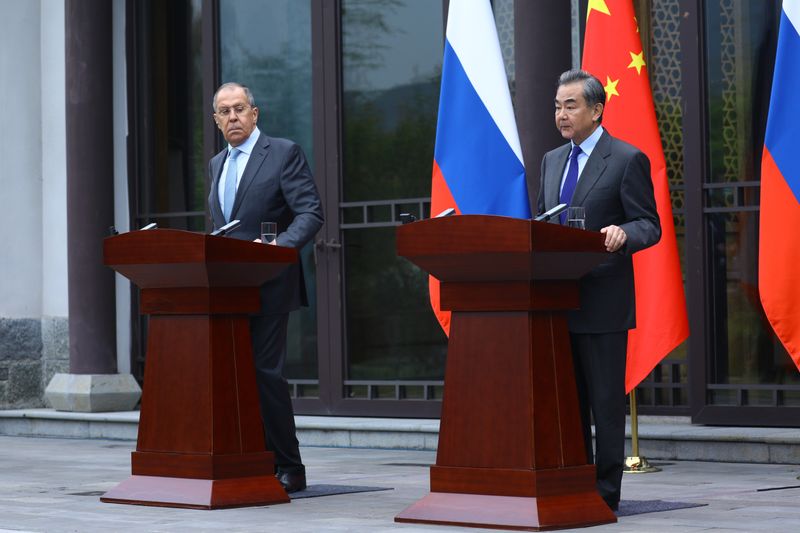By Gabriel Crossley and Katya Golubkova
BEIJING/MOSCOW (Reuters) - Russian Foreign Minister Sergei Lavrov began a visit to China this week with a call for Moscow and Beijing to reduce their dependence on the dollar and Western payment systems, and push back against what he called the West's ideological agenda.
It comes after years of souring relations between the United States and China over trade and national security issues, and long-standing tensions between Russia and the United States.
In the latest development, the United States, European Union, Britain and Canada on Monday imposed sanctions on a handful of Chinese officials for alleged human rights abuses in Xinjiang, opening the door to potential joint penalties.
RISKS IN DOLLAR DEPENDENCE
The dollar's global dominance gives the United States an outsized influence over the world's financial system, while its actions against foreign companies can have far-reaching consequences given it is home to the world's largest economy and some of the biggest global companies.
Given the influence of the dollar and U.S. banks in global financial flows, the United States dominates the Belgium-based SWIFT financial messaging service, a network used by banks across the world to make transactions. It could in theory use this influence to reduce other countries' access to the global financial system.
Hong Kong leader Carrie Lam said last year she had to pile up cash at home as she was unable to open a bank account in the global financial centre since Washington sanctioned her after Beijing imposed a national security law on the city.
WHAT HAS CHINA DONE SO FAR?
As it looks to reduce its dependence on the greenback, China has been pushing to internationalise the yuan amid fears of a deepening financial war with the United States.
To this end, it has been using its Belt and Road initiative to promote trade in the yuan, and has signed local currency swap agreements with many of the participating countries, including Russia.
Beijing has also been encouraging the use of its homegrown alternative to SWIFT, known as the CIPS clearing and settlement services system, where 135.7 billion yuan ($19.4 billion) a day was processed in 2019, according to CIPS. Most of China's cross-border transactions, however, are still settled in dollars via the SWIFT system.
China's holdings of U.S. Treasuries meanwhile fell to the lowest levels since 2017 in October, but have since risen again, according to the U.S. Treasury Department.
WHAT HAS RUSSIA DONE?
Russia has been taking steps to reduce its dependence on the dollar for years, particularly after ties with the West deteriorated over Russia's annexation of Crimea in 2014 and its role in the Ukrainian crisis.
Russia and China have also sought to reduce bilateral trade denominated in U.S. dollars, with Russia's dollar-denominated exports to China falling to 61% in the first three quarters of 2020 from 90% for the total of 2013, according to data from Russia's central bank.
At $6.15 billion in January, Russia's holdings of U.S. Treasuries were well below the record high of $176.3 billion it owned in October 2010.
Similarly to China, it has set up its own banking messaging system, known as SPFS, as an alternative to SWIFT. Its own card payment system MIR began operating in 2015 and it has significantly expanded the role of its own financial transactions clearing house in recent years.
Russia also said in February it added the yuan and Japanese yen to its National Wealth Fund to diversify its savings.
WHAT'S NEXT?
With around 56% of global central bank reserves held in U.S. dollar in the third quarter of 2020, according to IMF data, the greenback remains the world's reserve currency of choice.
The yuan has some way to go to catch up.
Only 2% of global central bank reserves are held in the Chinese yuan, although Morgan Stanley (NYSE:MS) analysts expect this share could increase to 10% by 2030.
But yuan internationalisation is seeing renewed enthusiasm amid fears of worst-case scenarios under which China is blocked from dollar settlements, or Washington freezes or confiscates a portion of China's huge U.S. debt holdings.
China's central bank has urged financial institutions to expand yuan trade and prioritise local currency use in direct investment. Beijing has also fast-tracked plans to develop a sovereign digital currency.
